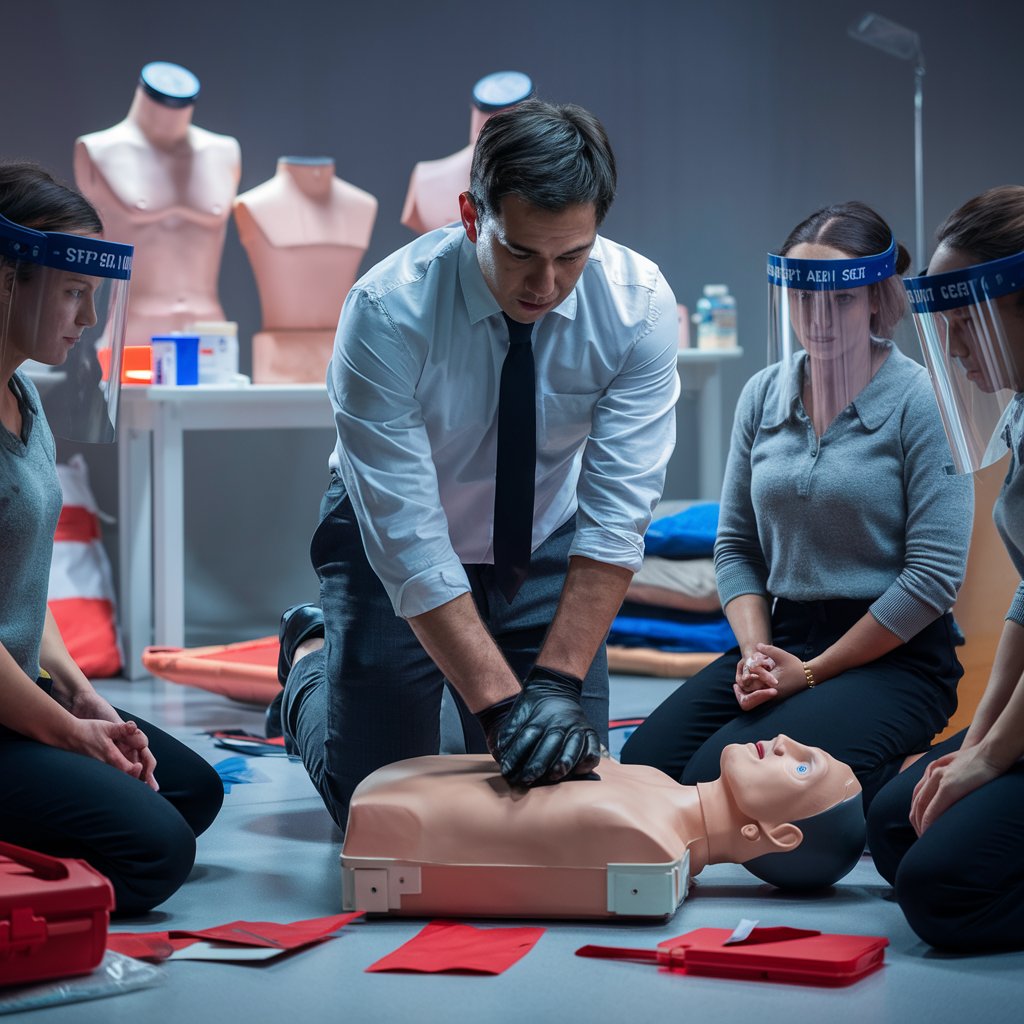In today’s fast-paced world, the need for lifesaving skills such as CPR (Cardiopulmonary Resuscitation) has never been more crucial. Benefits of Flexible CPR training programs, such as the Heartsaver First Aid course offered by CPR with Dr. L, provide an accessible and efficient way to gain these essential skills.
What Benefits of Flexible CPR Training Programs
Accessibility and Convenience
One of the main benefits of flexible CPR training programs is their accessibility. Traditional CPR classes often require significant time commitments, which can be challenging for those with busy schedules. Flexible programs allow you to learn at your own pace and fit the training into your schedule without disrupting your daily routine.
Increased Participation
Flexible CPR training options, such as online courses, have made it easier for more people to participate. This increased accessibility leads to more certified individuals, which enhances community safety. The more people who are trained in CPR, the higher the chances of someone being available to respond effectively in an emergency.
Continuous Learning
Flexible CPR training encourages continuous learning and skill retention. With options to revisit course materials and engage in refresher modules, you can ensure that your CPR skills remain sharp and up-to-date. This ongoing learning approach is crucial for maintaining proficiency and confidence in emergencies.
What benefits of Flexible CPR Training Programs Entail
Comprehensive Training Modules
Flexible CPR training programs, like the Heartsaver First Aid course, offer comprehensive training modules that cover all essential aspects of CPR. These modules typically include:
Basic Life Support: Techniques for performing chest compressions and rescue breaths.
AED Training: Instruction on how to use an Automated External Defibrillator.
First Aid Basics: Guidance on managing common injuries and medical emergencies, such as choking, bleeding, and burns.
Interactive Learning
Many flexible CPR training programs utilize interactive learning tools, such as videos, quizzes, and virtual simulations. These tools enhance the learning experience by providing practical, hands-on practice in a virtual environment. This approach helps to reinforce the material and build confidence in your ability to perform CPR.
Certification and Recertification
Upon completion of a flexible CPR training program, you receive a certification card that is recognized by various organizations and employers. Additionally, these programs often offer recertification options, allowing you to maintain your credentials and stay current with the latest CPR guidelines and techniques.
Who Benefits from Flexible CPR Training Programs
Healthcare Professionals
For healthcare professionals, maintaining CPR certification is often a requirement. Flexible CPR training programs allow them to fulfill this requirement without taking time away from their demanding work schedules. It ensures that they can stay up-to-date with the latest life-saving techniques while continuing to provide patient care.
Educators and Coaches
Teachers, coaches, and childcare providers can greatly benefit from flexible CPR training programs. With busy schedules and numerous responsibilities, the ability to complete CPR training at their convenience is invaluable. This certification ensures that they are prepared to respond to emergencies involving children and students.
Parents and Caregivers
Parents and caregivers are often the first responders in household emergencies. Flexible CPR training programs equip them with the knowledge and skills to handle situations such as choking, drowning, and cardiac arrest. Being able to complete the training on their own time makes it more feasible for busy parents to become certified.
Community Volunteers
The benefit of flexible CPR training programs Community volunteers, such as those involved in neighborhood watch programs, disaster response teams, and local events, can also get benefits. Having more trained individuals in the community enhances overall safety and preparedness.
10 Key Benefits of Flexible CPR Training Programs
Convenience and Flexibility
Flexible CPR training programs allow you to complete the training at your own pace and on your schedule. This convenience ensures that you can fit the training into your busy life without sacrificing other commitments.
Enhanced Retention and Confidence
With the ability to review materials and practice skills as needed, flexible CPR training programs promote better retention of the techniques. This continuous learning approach boosts your confidence in your ability to respond effectively in an emergency.
Accessibility for All
Flexible CPR training programs remove barriers to participation by offering online and hybrid training options. This accessibility ensures that more people can become certified, increasing the number of potential lifesavers in the community.
Cost-Effective
Online and flexible CPR training programs are often more cost-effective than traditional in-person classes. This affordability makes it easier for individuals and organizations to invest in life-saving training.
Regular Updates and Refresher Courses
Flexible CPR training programs often include regular updates and refresher courses to keep your skills current. This ongoing education is crucial for staying informed about the latest CPR guidelines and techniques.
Wide Recognition
Flexible CPR training programs, like the Heartsaver First Aid course, are widely recognized by employers, organizations, and professional bodies. This recognition ensures that your certification is valid and respected.
Practical Skills for Real-Life Situations
Flexible CPR training programs provide practical, hands-on training that prepares you for real-life emergencies. The interactive modules and virtual simulations enhance your ability to perform CPR confidently and effectively.
Improved Community Safety
By increasing the number of certified individuals, flexible CPR training programs contribute to improved community safety. More people trained in CPR means more potential responders in emergencies, leading to better outcomes for those in need.
Personal Empowerment
Being certified in CPR is empowering. It provides you with the skills and knowledge to make a difference in critical situations, giving you the confidence to act and potentially save lives.
Professional Development
For many professionals, CPR certification is a valuable addition to their skill set. It enhances their qualifications and demonstrates their commitment to safety and preparedness, which can be beneficial for career advancement.
Benefits Of Flexible CPR Training Program Transformation
Benefits of Flexible CPR training programs, such as the Heartsaver First Aid course offered by CPR with Dr. L, provide numerous benefits that make them an essential training option for everyone. From the convenience and accessibility of the training to the enhanced retention and community safety it promotes, flexible CPR training is a valuable investment in your skills and preparedness. Whether you are a healthcare professional, educator, parent, or community volunteer, obtaining a flexible CPR certification equips you with the knowledge and confidence to respond effectively in emergencies, making a significant difference in the lives of those around you.
The benefits of flexible CPR training programs, you not only gain a vital skill but also contribute to a safer, more prepared community. The benefits of flexible CPR training extend beyond personal empowerment to professional development and community safety, making it a wise and impactful choice for anyone committed to making a difference.







